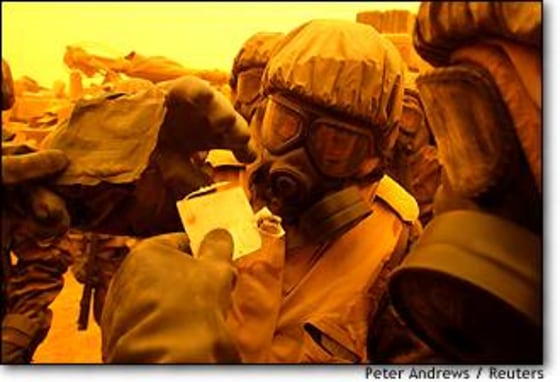As American and British forces close in on Baghdad, the danger increases that biological or chemical weapons are going to be used against them. Are we ready? We may not be. If not, that is ethically troubling since we have had 12 years since the last Persian Gulf War to get ready.
We have improved the way we monitor our soldiers before and after deployment. But we still don’t test treatments against biological or chemical agents in human subjects, relying instead on interpreting results from animals for humans.
In times such as ours, soldiers on the battlefield should not be guinea pigs for these necessary medicines.
Better health monitoring needed
The first line of defense against a chemical or biological attack is to know enough about the health of those on the battlefield to figure out if they have been exposed. We do have technology that can detect biological and chemical agents and this equipment is better than what was in the field during the Gulf War.
We have also done a better job of trying to monitor the health of those currently deployed to the Persian Gulf. In the last war, when tens of thousands of veterans came home complaining of symptoms which collectively were tagged “Gulf War syndrome,” it was impossible to know if the veterans were made sick by biological or chemical agents.
No one knew much about their health pre-deployment. Not much information was obtained about what they had been exposed to while in Kuwait, Iraq and Saudi Arabia. And even less was known about their health status at the end of that war. Without a baseline of information, the hunt for the cause of Gulf War illness proved hopeless.
Assessment is better today
The situation is a bit better today. Blood samples have been drawn and stored from many of those who are now in the Gulf.
Military doctors are trying to keep better records on who is exposed to what. And many soldiers were asked to fill in surveys about their overall health before they left the United States.
Still this is not enough. To get a real baseline, in-depth physical and psychological examinations should be performed. Self reports about health are notoriously unreliable.
And it is even more important that some of the troops and civilians currently in the Gulf undergo careful physicals before coming home. The best defense we have against another outbreak of Gulf War illness is to know as much as we can about the health of those now involved in the fight.
What about antidotes?
The second line of defense against chemical and biological weapons is antidotes. There are several drugs and vaccines available that may help counteract the lethal impact of chemical and biological weapons.
Some troops have been supplied with drugs, such as pyridostigmine bromide (PB), to counteract the effects of nerve gas. Still others were vaccinated against anthrax, smallpox and botulism using vaccines whose safety profile is either not known or not perfect.
The key issue surrounding antidotes is whether they have been tested enough to show that they will not cause more problems then they prevent. And if the threat of biological or chemical attack is real, then testing antidotes only on animals in inadequate.
Right now some antidotes are being used with only animal data to support their safety. Meanwhile, some studies that might involve human testing to prove safety and efficacy are being delayed due to uncertainty about the ethics of testing dangerous agents on human subjects.
Risky human research is warranted
I think the case can be made that some types of risky research involving human subjects can be justified.
The subjects would have to know exactly the type of dangers they could face. In addition, reviews by independent scientists of proposed studies would have to be as stringent as possible, and compensation for those hurt or even killed should be clear and generous.
In a world threatened by weapons of mass destruction, using hundreds of thousands of troops and civilians as guinea pigs makes little sense.
If there are people who would volunteer as subjects and if animal data shows how to test antidotes without asking volunteers to face serious risks of harm, then some testing that could have been done should have been done.
And some tests that are now stalled in the pipeline ought to proceed.
We are better prepared today to face biological and chemical warfare then we were 12 years ago. But, we are not yet prepared enough to adequately protect our troops.
Arthur Caplan, Ph.D., is director of the Center for Bioethics at the University of Pennsylvania in Philadelphia.
